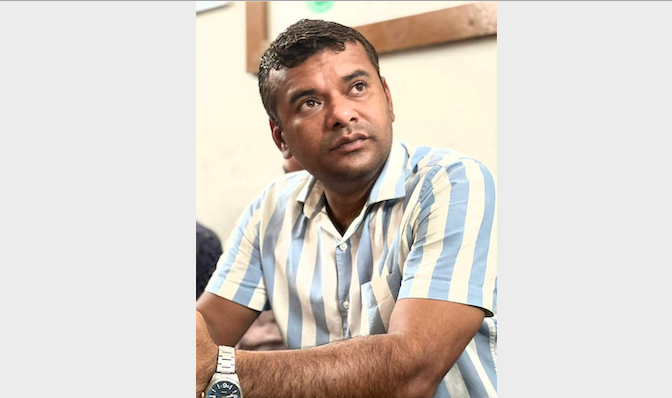Success will only come when every conscientious citizen speaks out against this fascism and actively participates: Rashed Iqbal Khan
Publish: 01 Jan 2024, 05:50 PM

Rashed Iqbal Khan assumed leadership of the Nationalist Chhatra Dal during a pivotal moment in the movement to restore democracy. He currently serves as the acting president of Chhatra Dal, having previously held the position of senior vice president within the organization. Rashed Iqbal, a former student of Dhaka University, was born in Narsingdi. In a recent interview with Bangla Outlook, he stated that approximately 3500 rank-and-file Chhatra Dal leaders are imprisoned in various jails across the country. Furthermore, hundreds of student leaders have been sentenced to 1 to 14 years in fabricated gayebi (ghost) cases, while hundreds of Chhatra Dal leaders have fallen victim to shootings and fatal attacks over the past 15 years.
Bangla Outlook: How should the role of the student society be in response to the ruling government of Bangladesh unilaterally electing the twelfth national parliament?
Rashed Iqbal Khan: Much of Bangladesh's political history is intertwined with student movements. The students have played various roles in these movements. However, over the last 15 years, this government has stripped away people's rights, causing them to forget their entitlements. Politics has subtly diverted a generation, leaving many in the present generation unaware of the students' significant responsibility in propelling a country forward. Consequently, this fascist government is once again deceiving the people with confidence towards the elections, but it won't be an effortless task. People comprehend the situation, and so do the students. Despite the ceaseless oppression by the state apparatus, we are progressing forward.
BO: Does Chhatra Dal, as a large student organization, possess the capability to play a significant role, or do you believe there is a deficiency?
RIK: There is a deficit. We face a situation radically different from the 90s, 52, 69 or 71. However, currently, student organizations don't coexist peacefully on any university campus in Bangladesh. Student leaders can't even reside in the halls or their homes. There isn't a prison in the country where university student leaders aren't imprisoned. Every police station in Bangladesh has at least 10 cases against student leaders.
Furthermore, typical students are diverted from the country's politics by alluring them with BCS exams, jobs, and corporate opportunities, causing many to forget their patriotism. Simultaneously, this fascist government has deprived the educated society of their rights—fundamental, constitutional, and human rights. Consequently, we need to regain some momentum. Nonetheless, as students, we continue to fight for democracy, making the highest sacrifices.
BO: Do you have coordination with other student organizations, as was seen in various movements, including the anti-dictatorship movement of the 90s?
RIK: There is constant communication. We may not be marching or meeting together, but the movement remains united.
BO: Citizens have a lot of expectations from students. Can Chhatra Dal meet that expectation?
RIK: Right now, almost three thousand Chhatra Dal leaders are imprisoned in different prisons across the country. Hundreds of student leaders have been sentenced to 1 to 14 years in false, fabricated absentee cases. Additionally, hundreds of Chhatra Dal leaders have been shot and hacked to death in the last 15 years, and many have gone missing. Numerous Chhatra Dal leaders have forsaken their dream careers due to lawsuits and false convictions. On the other hand, what are civil society and intellectuals doing? Is the responsibility solely on the students, or do they share any responsibility? After freeing the country from dictatorship in the 90s, why did it revert to such a situation in the last 15 years? The student continues the movement borne from the responsibility of conscience. Success will only come when every conscientious citizen in society speaks out against this fascism and actively participates.
BO: What is Chhatra Dal doing to raise awareness among the students or encourage them to voice their concerns about the ongoing irregularities?
RIK: As we cannot go to the campuses and the constitutional institutions of the government have become ineffective, our work is also facing significant challenges. Nevertheless, we persist in conducting various campaigns across all campuses. An attitude of patriotism and opposition to the tyranny of this government has also emerged among the typical students.
BO: How optimistic are you about the success of the movement? There are occasional inconsistencies; please clarify them.
RIK: Farmers, workers, professionals, employees, and ordinary citizens all yearn for an end to this situation. The pro-democratic and patriotic student society stands united with Chhatra Dal, aiming to restore the desired democracy in the country. However, people are weary from enduring prolonged persecution and facing significant troubles. Nonetheless, victory seems imminent. Surprisingly, there's no lack of coordination among any organizations protesting alongside us, including Chhatra Dal. We stand united. You will be able to see a significant movement in a short period. As fascism falls, the student body will return to campuses and classrooms. The desired democracy will be reinstated in the country, freeing society from discrimination and positioning Bangladesh as a potent entity on the global stage.
BO: Thank you.
RIK: Thank you, Bangla Outlook, for your contributions. Please highlight the voices of pro-democracy. We anticipate Bangla Outlook's active participation in this movement through the practice of independent journalism.
